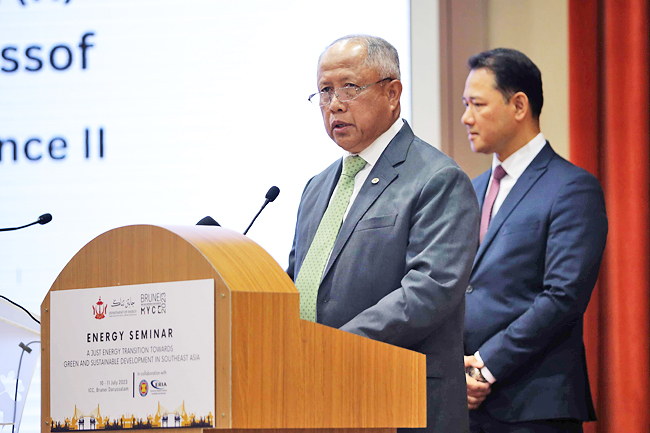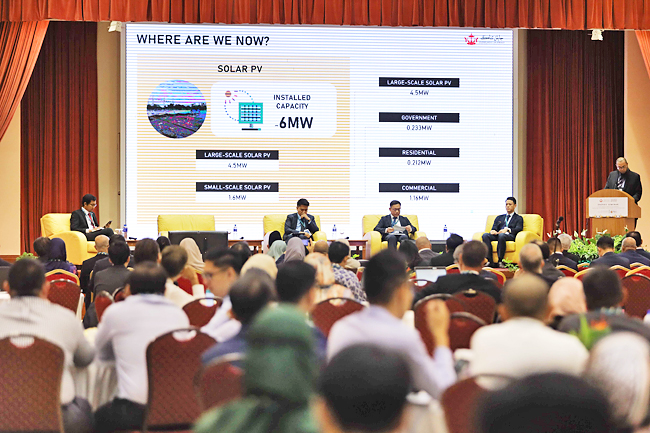Minister at the Prime Minister’s Office and Minister of Defence II Pehin Datu Lailaraja Major General (Rtd) Dato Paduka Seri Haji Awang Halbi bin Haji Mohd Yussof yesterday highlighted the Sultanate’s vital move toward energy transition during his keynote address at the launch of the Energy Seminar ‘A Just Energy Transition Towards Green and Sustainable Development in Southeast Asia’ in conjunction with the Brunei Mid-Year Conference and Exhibition 2023 (Brunei MYCE 2023).
The minister shared that energy transition does not just require a whole-of-nation approach, but it also warrants regional collaboration. He was referring to the Government of His Majesty Sultan Haji Hassanal Bolkiah Mu’izzaddin Waddaulah ibni Al-Marhum Sultan Haji Omar ‘Ali Saifuddien Sa’adul Khairi Waddien, Sultan and Yang Di-Pertuan of Brunei Darussalam’s steps to advance the national solar energy target of 200 megawatts by 2025, and at least 30 per cent of the power generation mix by 2035.
The Sultanate is currently exploring the potential of renewable energy-based connectivity through interconnection with neighbouring countries, he said.
“Brunei Darussalam hears the call that oil and gas will still be an important part of the regional energy mix, especially to fuel energy transition. The country recognises the need to contribute to the growing oil and gas demand to ensure continued market stability; regionally and globally,“ the minister said.
Oil and gas, he said, will continue to play an essential role in the national energy security for decades to come, by driving economic growth and advancing energy transition efforts.
It is important to promote the upstream oil and gas development. While continued investment in the upstream sector is crucial, investment in mitigating the emissions from the sector is also needed for achieving net zero goals, he said.



The minister thus called on oil and gas industry players to play their part in realising the energy transition.
He outlined three key steps of emissions mitigation: minimise emissions through application of renewable or cleaner alternative energy; optimise current operations to lower both carbon and methane emissions; and capture emissions by developing the necessary capacities and capabilities in carbon capture and storage (CCS).
The country will also develop a regulatory framework that would promote application of CCS.
Southeast Asia, he said, “is among the fastest growing economic regions with regional energy demand that is expected to triple by 2050 from 2020 levels. As projected in the 7th ASEAN Energy Outlook, the demand for oil and natural gas is expected to increase, dominating over 50-per-cent share of ASEAN’s energy mix in 2050 scenarios. At the same time, the region is unquestionably committed towards Net Zero with most already taking a pledge on top of their respective nationally determined contributions (NDCs).
“ASEAN’s well-known aspirational target is to increase the component of renewable energy to 23 per cent by 2025 in the ASEAN energy mix. Besides that, the region has a high stake being one of the most vulnerable regions to climate impact“.
A just energy transition in the ASEAN region requires recognising the diverse economic development of each country and pursuing unique pathways towards common Net Zero goals.
The minister believes that it is imperative to prioritise pragmatic transitional solutions that promote equitable progress, energy security, and emissions mitigation.
“As we work towards a sustainable future together, we must prioritise the availability and accessibility of technological and financial solutions to mitigate oil and gas emissions. To assist the region in doing so, collaboration with advanced ASEAN dialogue partners become crucial in accessing the necessary technology and investment at an accelerated pace,” the minister added. – James Kon


